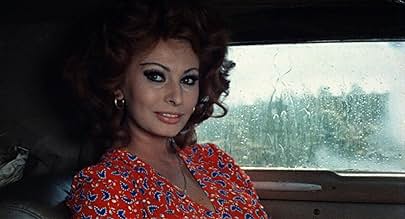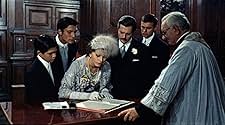IMDb RATING
7.4/10
12K
YOUR RATING
Wealthy businessman Domenico and penniless prostitute Filumena share a large part of their lives in post-WWII Italy.Wealthy businessman Domenico and penniless prostitute Filumena share a large part of their lives in post-WWII Italy.Wealthy businessman Domenico and penniless prostitute Filumena share a large part of their lives in post-WWII Italy.
- Nominated for 2 Oscars
- 7 wins & 10 nominations total
Marilù Tolo
- Diana
- (as Marilu' Tolo)
Alberto Castaldi
- Doctor
- (as Alberto Gastaldi)
Vincenzo Aita
- Alfonso - Priest
- (uncredited)
Featured reviews
A fine showcase for Sophia Loren who at the age of thirty portrays and older women seemingly at death's door as well as a young girl of seventeen. And throughout she has a fantastic rapport with Marcello Mastroianni and however fantastical becomes the action, however unrealistic the Italian 'realism' we believe in her. She is not, if there is such a thing, a 'classic' beauty and yet she always looks lovely. Her face can express sadness, concern, happiness and glee, all within seconds of each other and with her all the time remaining attractive. Her body is probably even more remarkable but it is the way she can move that is truly magical, and sexy. She can striptese all day long but the magic is when she begins to walk or skip along the street. Remarkable. And on the screen, of course, quite magical. So if the first half of this Vittorio De Sica film can be sluggish with comedic moments that don't quite cut it today (if they ever did outside of Italy) there is always Loren to look at and the pairing of the two to enjoy. Things get going and if we find it hard to glorify prostitution one moment and femininity and motherhood the next, it is not a problem for the Italians and eventually we too are swept along in a romanticised wave of well being.
One of the biggest hits of the "Italian Comedy", starred by the top of the Italian star-system. De Sica give us a solid film all along the length, taking us from drama to comedy, they're separated by a faint border; as the life itself.
Obviously, the time has passed and some points are old-fashioned (technical resources, technology, life's perspective) but it's true the film gets one realistic approach (it couldn't be less being this film one of the examples of Italian neo-realism) about the drama of a woman who looks for dignity and fights for the good of her children.
This pink neo-realism sows us the common life of Italian people after WWII. Mediterranian country, misogyny, catholic, conservator, noisy similar to Spain (españolada, Landismo), Greece, etc.
Good performances form Mastroianni, who is a playboy but with a good heart at least, and, especially Sophia Loren, at her prime, as Filomena, a prostitute who will fight for her honesty, dignity and her sons, a woman with attitude, tough in her acts and with some real curves. In other words the best "donna", along with Magnani, in all history.
De Sica, without reaching the lever of previous works in the 40's, makes a gret work in a field he controls like only a few people more. Good photography and ambiance. Music as Italian music, little cloying but it don't bother and it suits the film.
Thou, there are some negative points: - Relationship with children and their reaction are unnatural and the aren't worked as it'd be necessary. - Story could be analyzed in a deeper way. It's a good topic. - Make-up of Loren at 17, she doesn't look even for a moment, her body is different, no one can't do it something about it with that clothes, but the make-up could be better.
But it's a good movie, despise of these thing and the fact that is a movie made in the early 60's and other things I can't remember. You can enjoy this film and discover if you didn't make it earlier the refreshing Italian cinema.
Obviously, the time has passed and some points are old-fashioned (technical resources, technology, life's perspective) but it's true the film gets one realistic approach (it couldn't be less being this film one of the examples of Italian neo-realism) about the drama of a woman who looks for dignity and fights for the good of her children.
This pink neo-realism sows us the common life of Italian people after WWII. Mediterranian country, misogyny, catholic, conservator, noisy similar to Spain (españolada, Landismo), Greece, etc.
Good performances form Mastroianni, who is a playboy but with a good heart at least, and, especially Sophia Loren, at her prime, as Filomena, a prostitute who will fight for her honesty, dignity and her sons, a woman with attitude, tough in her acts and with some real curves. In other words the best "donna", along with Magnani, in all history.
De Sica, without reaching the lever of previous works in the 40's, makes a gret work in a field he controls like only a few people more. Good photography and ambiance. Music as Italian music, little cloying but it don't bother and it suits the film.
Thou, there are some negative points: - Relationship with children and their reaction are unnatural and the aren't worked as it'd be necessary. - Story could be analyzed in a deeper way. It's a good topic. - Make-up of Loren at 17, she doesn't look even for a moment, her body is different, no one can't do it something about it with that clothes, but the make-up could be better.
But it's a good movie, despise of these thing and the fact that is a movie made in the early 60's and other things I can't remember. You can enjoy this film and discover if you didn't make it earlier the refreshing Italian cinema.
10paolo-28
Well I think that you should watch this wonderful Italian film. It is taken from the comedy "Filumena Marturano" by Eduardo De Filippo. Marcello Mastroianni is superb and Sophia Loren is excellent. It's a pity she didn't won the second Oscar as best actress of this film.
The title-song "'O cielo ce manna 'sti 'ccose" by Fred Bongusto is absolutely wonderful.
The title-song "'O cielo ce manna 'sti 'ccose" by Fred Bongusto is absolutely wonderful.
Sophia Loren was the greatest actress of her generation when directed by Vittorio De Sica. Watching "Marriage Italian Style" in 2009 confirms that notion, totally. She is mesmerizing in this tragicomic creation by the great Neapolitan author Edoardo De Filippo. We manage to travel away from her external beauty, not an easy thing to do, and dive into her interior beauty and Oh God, how extraordinary! She is beyond truthful, she transforms the most basic element in a woman's heart into pure undiluted art. I was surprised to realize what a villain Domenico Soriano (Marcello Mastroianni) was. And he is the romantic counterpart! Here is where the Italians excel. What a terrifying act of self examination. The Italian male, as written by De Filippo, directed by De Sica and interpreted by the amazing Mastroianni is an everyday, almost acceptable monster in a society that breathes this kind of monster. Strange watching this now, Italy then, as far as women were concerned, were not that far away from a Muslim country. Women's role was basically subservient and a character like Mastroianni's could forge ahead un-accused and unrepentant. Besides the magic of the storytelling and the incredible performance by La Loren, this is is an excruciating document of its day.
The film employs a tremendously perky rhythm and register to showcase the traits of the earthly Italy at its post-war development, even though essentially the overwrought kernel of a prostitute's tribulations could hardly appropriate as a comedy material.
Vittorio De Sica's camera enigmatically haunts and pivots around two leads' present and past, the intangible love/hate chaos is disarmingly intriguing and subconsciously imbues the audience with a fervent compassion towards Sophia Loren's unswerving while passionate Filumena. The leading performance is worth of much accolade, especially for Sophia Loren, whose full-brown force of personality spanning over 20 years in the film and indisputably devotes a magnificent performance with all her zest and vigor. Marcello Mastroianni, is great as well, to hone up his versatility and render the womanizer an ambiguous moral criterion which is a more delicate task.
I cannot help being fascinated by the exquisite script as well, credited by five names, no wonder all the twists and turns are so fruitful in a way that both surprising and amusing. Nominated for 2 Oscars (BEST FOREIGN FILM and a second BEST ACTRESS nomination for Loren) and is a milestone which not only represents Loren's heyday but also is a comforting fruition of Loren-Conti correlation. Maybe it is not director De Sica's best canon due to its slight superficiality of machismo, which I sense may not be the director's fault as it is a general bias lies in all over the globe. Anyway, the film itself surely is a fine piece captures a genuine Italian aura (the Naples' style) and definitely worth your pocket.
Vittorio De Sica's camera enigmatically haunts and pivots around two leads' present and past, the intangible love/hate chaos is disarmingly intriguing and subconsciously imbues the audience with a fervent compassion towards Sophia Loren's unswerving while passionate Filumena. The leading performance is worth of much accolade, especially for Sophia Loren, whose full-brown force of personality spanning over 20 years in the film and indisputably devotes a magnificent performance with all her zest and vigor. Marcello Mastroianni, is great as well, to hone up his versatility and render the womanizer an ambiguous moral criterion which is a more delicate task.
I cannot help being fascinated by the exquisite script as well, credited by five names, no wonder all the twists and turns are so fruitful in a way that both surprising and amusing. Nominated for 2 Oscars (BEST FOREIGN FILM and a second BEST ACTRESS nomination for Loren) and is a milestone which not only represents Loren's heyday but also is a comforting fruition of Loren-Conti correlation. Maybe it is not director De Sica's best canon due to its slight superficiality of machismo, which I sense may not be the director's fault as it is a general bias lies in all over the globe. Anyway, the film itself surely is a fine piece captures a genuine Italian aura (the Naples' style) and definitely worth your pocket.
Did you know
- TriviaDomenico arranges an apartment in Naples for Filumena. The former tenant's belongings are still in. There is a picture of Clara Petacci (dictator Mussolini's mistress) on the wall and Filumena asks when this will be removed. The scene is set in the late 1940s, so this obviously symbolizes Italy's transition from fascism to a republic. Mussolini himself would probably not have passed the censors.
- Quotes
Filumena Marturano: [subtitled version] The problem is that our hearts used to be so big...
[holds up pebble]
Filumena Marturano: and now look how small they are.
- ConnectionsEdited into Marcello, una vita dolce (2006)
- SoundtracksMunasterio 'e Santa Chiara
(uncredited)
Written by Michele Galdieri and Alberto Barberis
Sung by Don Domenico on the trip home from the racecourse; Don Domencio also asks the boys to sing it
- How long is Marriage Italian Style?Powered by Alexa
Details
Box office
- Gross US & Canada
- $10,600
- Opening weekend US & Canada
- $4,967
- Sep 25, 2011
- Gross worldwide
- $206,875
- Runtime1 hour 42 minutes
- Sound mix
- Aspect ratio
- 1.85 : 1
Contribute to this page
Suggest an edit or add missing content






























